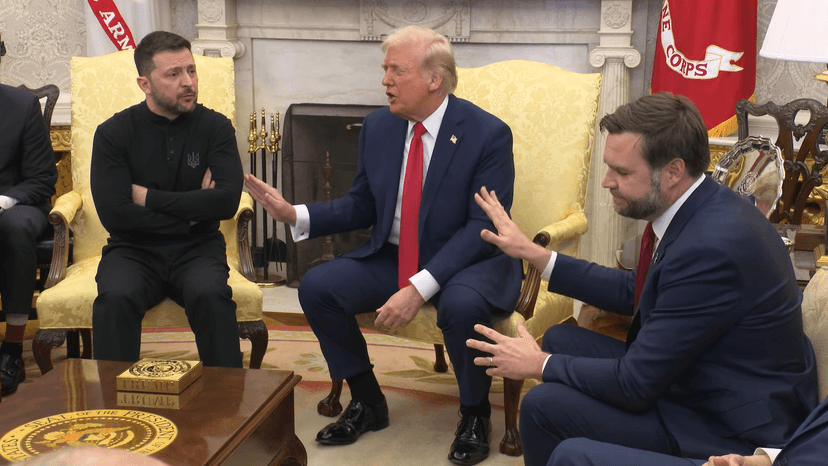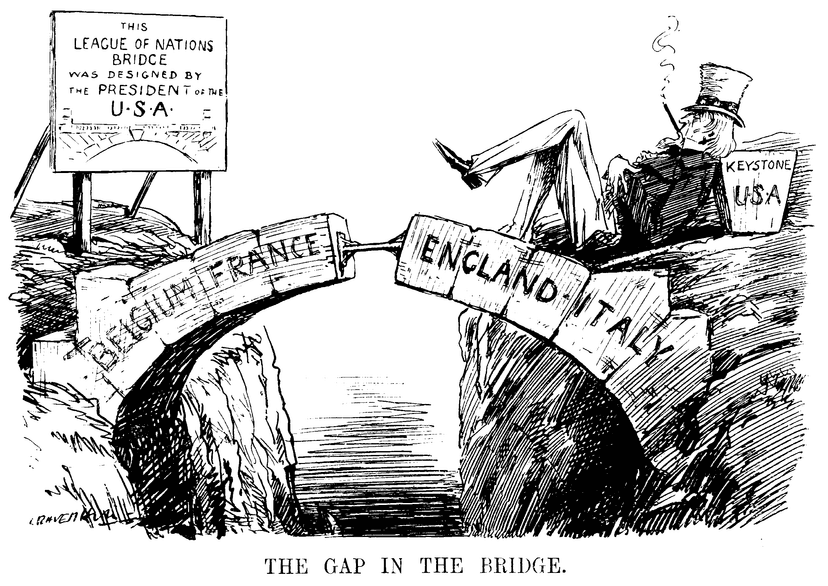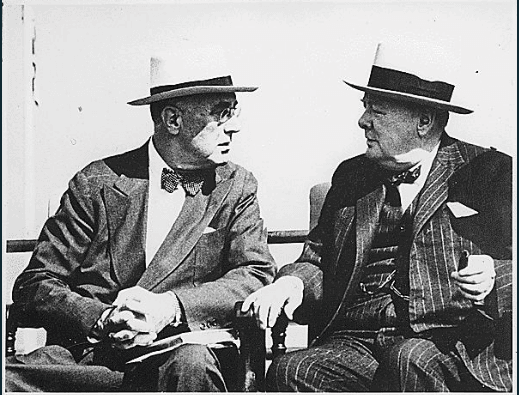

As America abdicates its power amid pressing international crises, a history of isolationism threatens to resurface.
William Dick
Mar 4, 2025 - 9:32 AM
Share


Neville Chamberlain returned from Munich in 1938 waving a piece of paper, saying triumphantly, “I have Mr Hitler's signature on it, we shall have peace in our time”.
President Trump says he, too, wants peace, and he thinks he can make a deal with Mr. Putin to secure it. We shall have to see if he succeeds, as his and JD Vance's churlish and aggressive bullying of President Zelensky in the Oval Office demonstrates a continuation of America's retreat from its position as the leading power in the world.

In August 2021, when Biden ordered the disastrously precipitous withdrawal of all U.S. forces from Afghanistan, I published an article on the Bruges Group website laying out the alternatives: which global power might step forward to fill the vacuum left by America’s abdication from its role as the world’s leader?
During his first presidency, Trump reached an agreement with the Afghan Taliban in Doha, effectively setting the stage for handing Afghanistan back to them. In August 2021, Biden implemented this with a precipitous withdrawal of all U.S. armed forces, which had been supporting the Afghan government.
The operation was poorly organized, leaving countless Afghans who had assisted Americans, as interpreters, aides, and collaborators, completely abandoned to the “tender mercies” of the Taliban. The images are unforgettable: desperate people clinging to the undercarriages of U.S. transport planes as they took off from Kabul airport, only to fall to their deaths on the tarmac, any fate preferable to the vindictive and murderous hands of the Taliban.
And now we see Trump and Vance browbeating President Zelensky in an appallingly churlish and disgraceful manner, peppering their remarks with gratuitous personal insults: “second-rate comedian,” “dictator,” “you started the war,” “do you own a suit?” in an effort to pressure him into signing away the Ukrainian people’s rights to their country’s mineral wealth. This is framed as “gratitude” for the assistance, wealth and weaponry, supplied by the U.S. to support Ukraine’s war effort so far. Notably, no repayment terms were ever mentioned when this aid was initially provided.

The USA has a long history of "isolationism", avoiding involvement in wars or costly ventures outside its own hemisphere, a policy once known as the Monroe Doctrine. In fact, the U.S. only entered World War I at the very end.
During World War II, President Franklin D. Roosevelt recognized the existential threat posed by Hitler’s aggressive expansion in Europe, aimed clearly at world domination. From the fall of France in June 1940, Britain stood alone against the Nazi juggernaut that dominated the continent. The fate of the world hung in the balance.
Churchill rallied his nation in its darkest hour, delivering his unforgettable speech to the House of Commons: "We shall fight them on the beaches, we shall fight them on the landing grounds, (....) until in God's good time the new world, with all its power and might, steps forth to the rescue and the liberation of the old."
Roosevelt resonated with this call to action, yet he knew that most U.S. voters were reluctant to engage in distant conflicts across the "big, beautiful ocean" (to quote President Trump). Many Americans had migrated from Europe to escape precisely the wars and hardships they were now being asked to intervene in.
British Prime Minister Neville Chamberlain had attempted to appease Hitler by allowing him to take Czechoslovakia, a “far-off country about which we know little.” Even today, many Americans would struggle to locate Ukraine on a map; only a small minority hold passports or have traveled abroad.
If the U.S. assistance provided to Ukraine so far amounts to $350bn, that represents roughly $1,000 for every American man, woman, and child. Trump’s demand that Ukraine “pay it back” likely appeals to segments of “deep America” who neither follow global affairs nor want their hard-earned tax dollars spent on foreign wars.
Zelensky, however, is acutely aware of Ukraine’s position on the front line. He is grateful for the support and knows that if Ukraine falls, neighboring countries, particularly those outside NATO, like Moldova, may be next. Trump, in contrast, appears to lack a broader geo-strategic perspective, overlooking the risk that Putin could use any respite to regroup, resupply, and continue his campaign to rebuild the Soviet sphere, which he has called the “worst tragedy of the 20th century.”

In Roosevelt’s day, the U.S. Congress had passed a law prohibiting the supply of weapons to foreign belligerents, though commercial sales were permitted. Churchill was desperately appealing for ships, tanks, fighter planes, and other materiel, confident that American factories could produce them in large quantities. “Just give us the tools, and we will finish the job,” he pleaded. To circumvent the Congressional ban, Roosevelt devised the “Lend-Lease” formula, supplying the UK with the essential “tools” of war it so urgently needed.
Then, on 7 December 1941, Japan attacked Pearl Harbor, thrusting the United States into a war it could no longer avoid. Shortly thereafter, Hitler and Mussolini declared war on the U.S. Had they not, America might have focused exclusively on the Pacific theatre. As it was, Roosevelt was able to persuade Congress and the American people that this was a truly global conflict.
The future of humanity hung in the balance: the outcome would determine whether the fundamental values of freedom, democracy, and basic decency would survive and prosper, or be crushed under the jackboot of the Axis dictators. Consequently, the U.S. deployed its power and resources in Europe as well, first reinforcing Britain’s defense and later taking the fight to the Axis heartlands.
Trump, however, does have a point in demanding that Europeans step up for their own defense. Since WWII, they have benefited from American largesse, particularly in defense, freeing up their budgets for generous welfare provision. They are now being called upon to fill the gap left by a reduction in U.S. commitment to funding the Ukrainian war effort.
Time will tell whether they are both able and willing to rise to this responsibility.
Share
William Dick
William Dick | Political and Legal Journalist